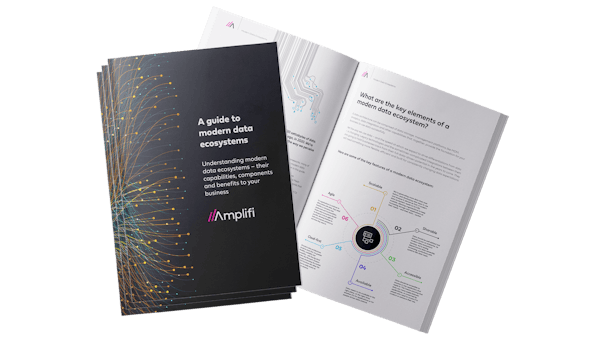- Core infrastructure - the platform that underpins your architecture, usually cloud-based.
- Ingestion – the pipelines that import data from multiple sources.
- Data storage – a storage solution or solutions: storage can be centralised or decentralised depending on your approach
- Data integration and virtualisation – technology that delivers data to where it’s needed.
- Data Access – technologies that make data available.
- Data Governance and management – processes that ensure data, including metadata, is accurate, reliable, secure and recoverable.
- Data Catalogue and Enterprise Knowledge graph – an organised inventory of data assets, using metadata to enable context, control and collaboration.
- Data security – inbuilt security protocols such as data masking, encryption and resilience.
- Modern Business Intelligence (BI) and analytics platforms – provide analytics capabilities to multiple personas across the organisation, incorporating augmented analytics and support for decision intelligence.
- Data Science and Machine Learning platforms – enables delivery of business value through the application of data science and machine learning techniques. Supports democratisation of Data Science and Machine Learning across the organisation as well as decision intelligence.
Culture: instilling accountability and democracy with data
Even if all of those technologies are present, a modern data ecosystem can only be successful if you have the culture to support it. As mentioned above, a modern ecosystem is about connections, interactions, governance and accountability as much as it is tools and platforms.
The success of a modern data ecosystem both depends on the attitudes and understanding of the people utilising it, and can encourage people to take greater accountability. Broadly speaking, this isn’t really any different to existing data ecosystems: governance has always been critical to making sure that data quality is maintained, while also encouraging more active engagement with data. The difference with a modern data ecosystem is that this accountability and governance is a core part of what knits the entire ecosystem together.
Whether you choose to introduce a well-defined approach like Data Mesh, which by its nature has a strong focus on accountability, or something more flexible, making sure that people take responsibility for data and systems is essential to making a modern data ecosystem work effectively. In turn, this transforms both individual and departmental attitudes to data. People are empowered to use data more creatively and explore their own vision for data, bringing more opportunities with data to the fore throughout the business.
How to introduce a modern data ecosystem
If you’re looking to introduce a modern data ecosystem, don’t throw out the rule book and start from scratch. It’s likely that the foundations of a modern data ecosystem already exist in the technologies and processes you have. To find out more about what it takes to implement a modern data ecosystem, download Amplifi’s guide to modern data ecosystems, where we cover understanding modern
data ecosystems – their
capabilities, components
and benefits to your
business.
Download: A guide to modern data ecosystems





